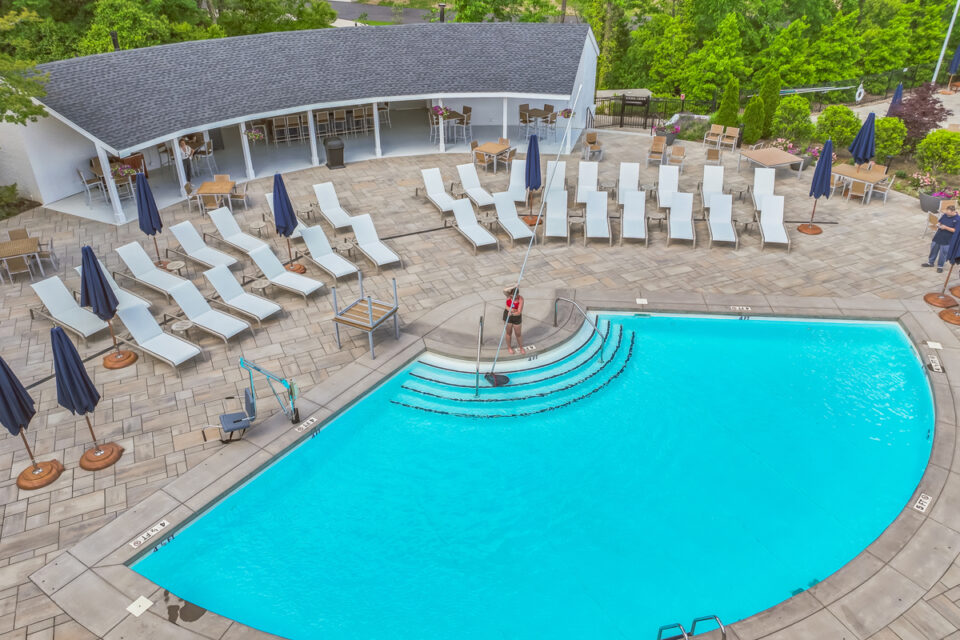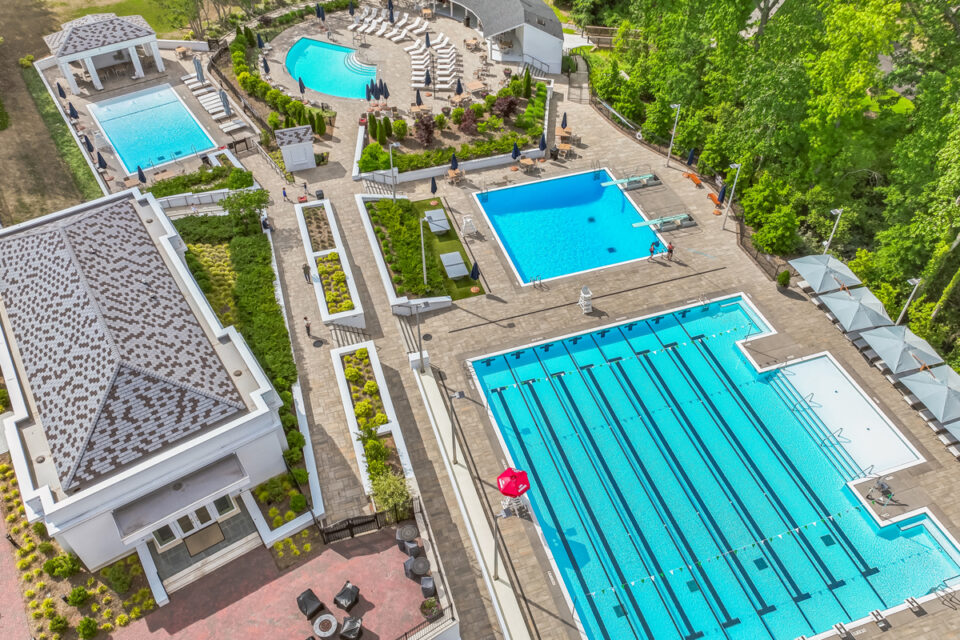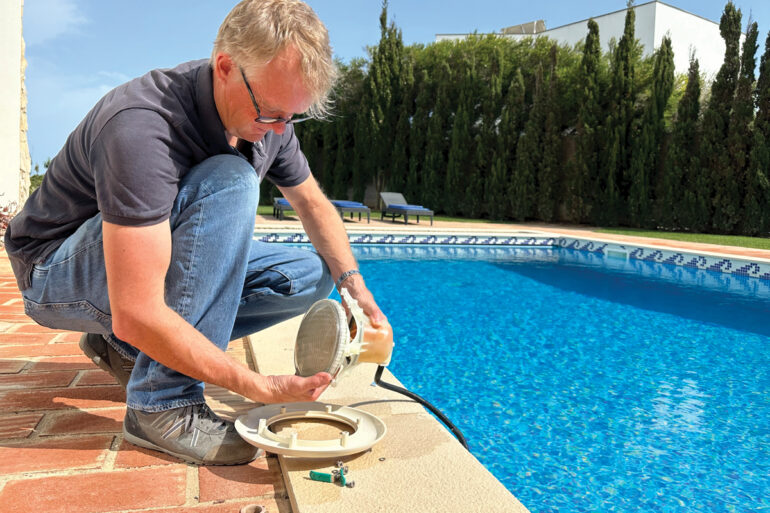Amenity to Asset
What it takes to run a commercial pool business in 2025

In today’s market, the commercial pool is no longer just a feature — it’s a centerpiece, a sales magnet and often the crown jewel of high-end developments.
“The pool area — along with other amenities — has become the focal point for the vast majority of projects,” says Keith Krebs, a 40-year industry veteran with Carlton Pools, a commercial pool builder, service provider and retailer with locations in Pennsylvania, New Jersey and Delaware. “A beautiful amenity space generates higher sales, stronger rentals and a greater chance of success for developers.”
That momentum shows no signs of slowing. “The commercial pool market continues to grow, driven by steady development and a strong renovation pipeline,” says Brian Bergeski, president of commercial aquatics at The Amenity Collective, a full-service amenity management and consulting firm. “New residential and mixed-use developments are still including pools as part of their amenity offerings, though the design is evolving. We’re seeing smaller footprints and shallower depths, reflecting both safety priorities and creative space use.”
With growing demand for premium experiences, pool pros face rising pressure to deliver smarter builds, faster timelines and long-term value.
Here, we explore the 2025 commercial pool landscape — from trends and tech to staffing and strategy — helping you stay ahead in a high-expectation market.
Explosive growth and soaring demand
Despite a tight economy, the demand for pool services is growing.
“Renovations are big right now,” says Jason Craycraft of Ohio-based Omni Pools & Scapes, a design-build firm focused on outdoor living and commercial pool construction. “A lot of properties built in the late ’90s and early 2000s are due for major updates — not just aesthetics, but upgrades to bring systems up to code and improve efficiency.”
In California, it’s a similar story. “Multifamily is thriving. It’s just bananas,” says Dustin Anderson, CEO of Precision Aquatics, a pool and spa service and repair company in San Diego.
From new builds to updates, commercial pool builders and servicers are staying busy. While builders manage complex installations, service companies are keeping aging pools running smoothly — and safely.
“Amenities are also driving demand; we’re talking about everything from integrated spas and sun shelves to LED lighting, fire features and outdoor lounging spaces,” Craycraft says. “On the sustainability side, we’re seeing more interest in variable-speed pumps, automated chemical controls, UV and salt systems and energy-efficient heating systems — especially in facilities looking to cut long-term operational costs.”
The rise of automation
Operational efficiency is becoming a dealbreaker for developers and operators. Chemical automation is now essential, not optional.
“Chemical automation is a huge deal for commercial pool service; my company does not accept new clients without chemical automation,” says Anderson, whose company specializes in commercial pool service and repair. “We offer programs to finance it, or we sell it at a discounted rate upon start-up.”
And for those lagging behind, Anderson offers a word of caution.

“Chemical automation is the trend that most swimming pools, spas, splashpads and everything commercial should have and [typically] do have,” he says. “It’s important as a service company that you’re savvy in that arena — you have to know how to service and sell it; you must be ultimately familiar in the arena to be successful.”
Automation isn’t just about convenience; it’s about reliability and liability. In the commercial sector, both can make or break a contract.
Compliance, compliance, compliance
Working in commercial means more eyes on the pool, including health inspectors.
“The health department is your friend,” Anderson says. “My service guys all have relationships with their local inspectors — half of them have their phone numbers and schedule their inspections versus having them [come as] surprises.”
That kind of proactive communication is key to avoiding shutdowns.
Florida-based pro Annie Jones — who owns commercial pool service company JJs Pool Service and partners with custom build and remodel firm Island Way Pools — agrees.
“I am always in contact with the Department of Health,” she says. “Sometimes I am sure I drive them crazy, but I am a ‘by the book’ person. Many times, I run into or take over situations that require a phone call.”
With commercial pools subject to strict bathing loads, insurance scrutiny and compliance checklists, staying in step with inspectors isn’t just smart — it’s essential.
Staffing, costs and the challenge of doing it right
Keeping a commercial pool safe and compliant is getting more expensive. With a skilled labor shortage persisting, Jones predicts some companies could exit the market.
“In the next few years, we may start to see a decline in people willing to take commercial accounts,” Jones says. “A lot of pool companies have cut back on certain products, like stabilizers, to save money. Some companies are ‘collecting’ pools and not keeping their word. Low bidding, false advertising — anything to get a few checks until they abandon the account.”
She runs her business differently, including requiring two experienced techs per service visit and conducting background checks before hiring. As a former police officer, she expects a clean background check.
But clients aren’t always eager to pay for premium service.
“Most accounts expect full service but only want to pay for partial,” Jones says.
In her company, full service means her team takes complete responsibility for water quality and pool operations — including testing, chemical treatment and logging — every day of the week. Partial service, by contrast, only covers days her team is physically on-site. On off days, the client is responsible for water testing and maintenance.
To protect both her business and public health, Jones draws a hard line between the two levels of service.
“I advise the Department of Health if an account is ‘partial’ and has or has not shown me they have a CPO-certified person to cover the off days,” Jones explains. “Partial service will not get the same guarantee as a full-service account. If anyone agrees to full service, and many do, I take full responsibility for all issues.”
Built for the big leagues
There’s no doubt: The commercial pool sector comes with higher stakes and higher barriers to entry.
“The commercial pool market demands substantial resources to support extended payment terms, higher insurance requirements and complex regulatory compliance,” says Kevin Boyer, chief operations officer of Poolsure, a company that provides chemical delivery, automation, training and service for commercial aquatic facilities. “To succeed, companies must maintain robust and scalable back-office operations that encompass customer service, dispatch, purchasing, accounting, IT systems and field support. Without this infrastructure, it’s extremely difficult to meet the service expectations of commercial clients or to operate reliably at scale.”
This is not an arena for the disorganized or the faint of heart.

“Don’t underestimate the importance of documentation and clear communication,” Craycraft says. “In commercial work, decisions get made in boardrooms — not at kitchen tables — and everything has to be tracked: specs, change orders, submittals, inspections. You’ve got to be organized, responsive and able to speak the language of construction managers and city officials. If you can’t navigate that world confidently, it’ll eat you alive.”
Anderson takes that responsibility seriously as well. He personally handles all documentation and compliance for clients.
“I’m not the pool cleaning guy; I’m the one who gets the paperwork that the clients’ boss will demand for inspections from the health department, for example,” he explains.
Timelines, red tape and real pressure
The commercial pool world isn’t just pricier, it’s also more complex. Juggling developers, inspectors, engineers and local codes can stretch even experienced pool builders.
“In commercial, you’re coordinating with multiple stakeholders and working under tighter permitting and code constraints,” Craycraft says. “Delays in approval or construction sequencing can derail a project fast. Also, liability and safety standards are much higher, so there’s no room for shortcuts or guesswork. The pressure to deliver on schedule while staying compliant is a lot higher than in the residential space.”
The companies that succeed are evolving with the times.
“We’ve expanded our services to include repair, renovation and maintenance to better support commercial pool operators,” Boyer says. “This integrated approach ensures our customers remain safe, compliant and operational while eliminating the need for multiple vendors and inefficiencies that come with fragmented oversight.”
Building reputation, relationships and results
Success in the commercial pool industry doesn’t come from cutting corners — it’s earned through strategic planning, smart technology choices and a skilled, dependable workforce.
“Take care of [your clients], and you will be successful,” says Krebs of Carlton Pools, who oversees both new construction and commercial maintenance. “Not every pool builder is a pro. Keep that in mind. Know your limitations and capabilities. Don’t overpromise, and make sure to install what you’ve promised with quality.”
Bergeski of The Amenity Collective adds, “Success lies in building strong teams, deep infrastructure and the agility to meet each client where they are. Delivering personalized service and consistent execution at scale is a challenge, especially during a roughly 100-day season. But when things go wrong, the response time matters — and sometimes, you don’t have days or even hours to fix it. You have to be ready now.”
And the payoff for doing it right is more than just a paycheck — it’s a rock-solid reputation.
“Commercial pool customers and operators don’t just want a blue pool,” Boyer says. “They want to limit liability, pass inspections every time and avoid surprise closures. They want assurance that their pool is safe, compliant and under control at all times.”






